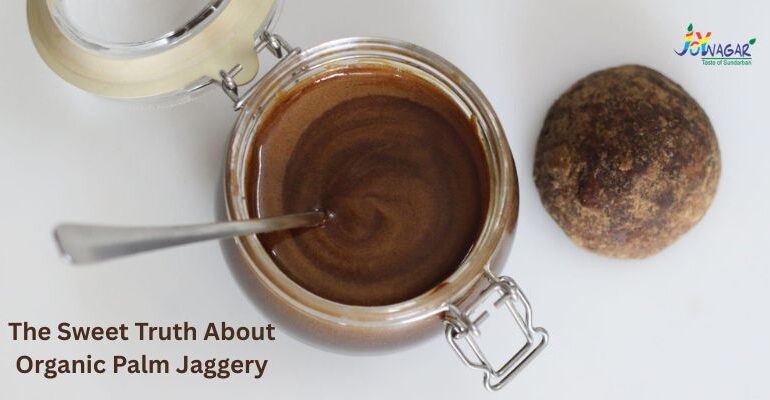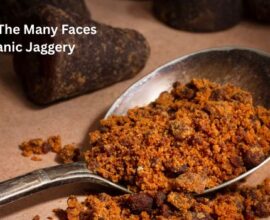Have you ever tasted a sweetener that not only satisfies your cravings but
also nourishes your body? That’s the magic of organic
palm jaggery.
Unlike refined sugar, it’s rich, earthy, and brimming with natural goodness. More than just a traditional treat, this wholesome sweetener is fast becoming a favorite in modern kitchens.
What Exactly Is Organic Palm Jaggery?
Palm jaggery, sometimes referred to as “karupatti” in South India, is made
by boiling the sap of date palm or coconut palm trees until it solidifies.
When produced organically, no synthetic chemicals, additives, or bleaching
agents are used, ensuring the product remains as close to nature as
possible. Its dark, rich color comes from natural molasses, unlike refined
sugar that loses its nutrients during processing.
Why Palm Jaggery Is Considered Healthier
Switching from refined sugar to palm jaggery can be a small yet impactful
lifestyle change. Research has shown that refined sugar contributes to
issues like obesity and diabetes when consumed excessively, while jaggery,
in moderation, offers a healthier alternative
(NIH).
Some notable benefits include:
- Rich in minerals like iron, magnesium, and potassium that help boost energy naturally.
- Supports digestion and may ease common issues like bloating or constipation.
- Acts as a natural detoxifier, cleansing the liver of toxins.
- Boosts immunity with antioxidants that fight oxidative stress.
Palm Jaggery in Everyday Cooking
One of the reasons palm jaggery is making a comeback is its versatility.
It’s not limited to traditional sweets like payasam or chikki. In fact,
more health-conscious households are using it in daily cooking. Add it to
your morning tea or coffee, drizzle over pancakes, or stir into oatmeal—it
lends a unique depth of flavor that sugar simply can’t match.
Ways to include palm jaggery in your diet:
- Use it as a natural sweetener in baking muffins, cakes, or cookies.
- Add it to homemade energy bars for a nutrient-packed snack.
- Mix with sesame seeds and nuts for a quick, healthy bite.
Why Organic Matters
Not all jaggery is created equal. Conventional jaggery may contain
artificial preservatives or undergo processing that diminishes its
nutritional value. Organic palm jaggery, however, guarantees purity. When
certified organic, it’s made from naturally cultivated palm trees without
chemical fertilizers or pesticides. The difference shows up not just in
taste, but also in long-term health benefits.
Choosing Quality Palm Jaggery Online
With the growing popularity of natural sweeteners, many brands now offer
jaggery. The key is to look for transparency in sourcing and production.
Reputable brands like Joynagar ensure that their products remain pure and
unrefined, giving customers authentic flavor and nutrition.
Quick tips to buy the best quality:
- Check if the brand provides organic certification details.
- Look for darker jaggery—it indicates higher mineral content.
- Avoid jaggery that looks too shiny or pale, as it may be processed.
FAQs on Organic Palm Jaggery
1. Is palm jaggery better than refined sugar?
Yes, palm jaggery is unrefined and retains essential nutrients, unlike refined sugar which offers only empty calories.
2. Can people with diabetes consume palm jaggery?
It has a lower glycemic index than refined sugar, but people with diabetes should consult a doctor before including it regularly.
3. How should palm jaggery be stored?
Store it in an airtight container in a cool, dry place to maintain its freshness and avoid moisture absorption.
4. Is palm jaggery safe for children?
Yes, when consumed in moderation, it’s a natural alternative to refined sugar and can be included in kids’ diets.
Final Thoughts
Organic palm jaggery is more than a sweetener—it’s a bridge between
tradition and wellness. Its rich flavor, nutritional benefits, and natural
origins make it a must-have for anyone seeking healthier lifestyle choices.
Whether you stir it into your morning tea or craft indulgent desserts, this
golden-brown gem adds both taste and nourishment.


